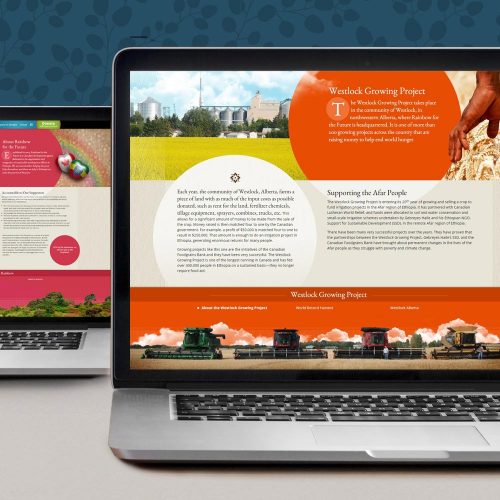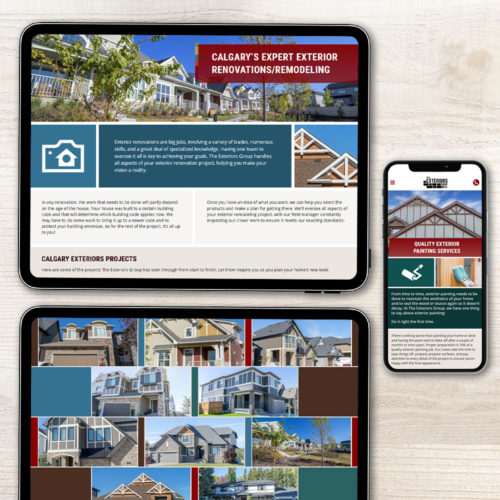 Web Design: 8 keys to success
Web Design: 8 keys to success
“You’ve got to be very careful if you don’t know where you are going because you might not get there.” YOGI BERRA
Your website isn’t just another marketing tool—it’s the online representation of everything your business is and everything it stands for. It’s a living thing that provides an experience that’s as close as people can come to physically visiting your business. Other forms of marketing are often static and usually represent one small aspect of your business. But a website is your business, at least virtually.
There are many ways websites can be improved, and they’re all based on the concept of not doing what everyone else is doing. Following trends and crowds will only lead to mediocrity.











Here are some tips that will help you, or your hired help, build a successful website:

1 Don’t be Afraid to Spend on your website—it’s worth it
“How much will it cost?” That’s the first question business owners usually ask when they’re thinking of creating or recreating a website. Needless to say, you get what you pay for. Cheap websites will almost always get poor results.
Money spent on an effective website is one of the best investments a business owner can make. The return on investment can dwarf the returns of any other marketing activity. People are willing to pay a lot of money for other marketing tactics, even though they often get lousy returns, but those same people skimp on their websites. Be the one who makes a wise investment.
2Keep Your Website Simple
It’s tempting to try to cram everything into a single web page: content, videos, calls to action, banner ads, newsletter sign ups, blog posts, promotions. Combine that with a garish design and you’ve just created a horror show for your customers. Simplicity works. Have a focus for each page, be nice to your visitors, and don’t attack all their senses at once. If people are overwhelmed, they’ll go somewhere else.
3 Ignore your competitors’ websites
Chances are you keep your eye on what your competitors are doing on their websites. And, if you’re like most business owners, you may try to copy what they’re doing. And they, in turn, are probably copying what someone else is doing. The fact is most of them don’t have a clue and are just fumbling around in the dark.
Be the leader, not the follower. Your business’s website should be as unique as your business. As you well know, you may offer the same products or services as your competitors, but you do it your way. And that’s what keeps your customers or clients coming back. Do what’s right for you when it comes to your WordPress website.
4Be a website Architect
Just like building a house, a website starts with planning—the blueprint for the final product. Omitting this step is a sure-fire way to produce a mediocre website. Take the time to plan your website, whether new or redesigned, before you jump right in.
Planning includes doing keyword research to discover what people are actually looking for, developing the content to address those searches, and creating a well-designed structure for that content. Doing this will save you a fortune on SEO later.
5Care about your brand
Have you ever stopped to think about the impression your business is making on its visitors? The number one reason visitors leave your site, and do so in a hurry, is trust. If your website is cluttered, has weak navigation, and an off-the-shelf look and feel, you’re not developing much trust.
Your business is too important to do that. Let people know “who” your business really is—your brand—and watch trust levels soar.
6Don’t Try to be cute
Cute is for babies. A misguided trend in websites is to create sites that are image rich but content poor, unless you’re a photographer or in the fashion business. Your visitors are more interested in what you have to say than at looking at cute images, and Google doesn’t care one bit about your images either.
Images are great, but only when they’re used to enhance your content. A cute design alone won’t get you more traffic. It’s well worth the cost to use experienced designers and developers to create your site and make sure your images, content, and site structure all work together.
7where’s the Beef?
Imagine the look on a client’s face if they asked you about your business and all you could muster was something like “Oh, we’re really great at what we do.”
You’re the expert in your business. Let people know that by giving them information. Describe all your products and services in detail, just the way you would if you were talking to a customer face-to-face, and give them other helpful advice that will convince them you’re the expert. It takes some effort to develop this content but who’s going to do it if not you? And, unless you’re an expert copywriter, it pays to hire a professional website copywriter.
Make your website content informative, not full of sales pitches. People come to your site to get information, not to be repeatedly hit over the head with a hammer. Write with your target market in mind and in the “voice” of your business.
Make sure each page grabs the visitor’s attention and use good headings to quickly convey what the page is about. People usually scan a page before they decide whether they want to read it. Captivating headings make it easier to get their attention.
Google loves content and rewards websites that engage visitors and keep them reading, watching, and coming back for more. And your visitors love interesting, educational content. An investment in a content-rich website should pay huge dividends.
8SEO: what’s that?
SEO, or search engine optimization, is something everyone talks about it. The problem is that few understand the basics and, for most small businesses, basics are all that’s necessary. Businesses will hire someone to do off-site SEO or internet marketing simply because everyone says they have to. But good SEO starts with an optimized website. A well-structured site with lots of keyword-optimized content will do wonders for your traffic. Make sure you hire someone who understands the importance of building websites right.


